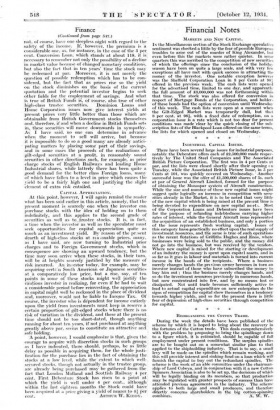• INDUSTRLAL CAPITAL ISSUES.
There have been 'several large issues for industrial purposes, notably the Debenture offers each of 12,500,000 made respec- tively . by The United Steel Companies and The Associated British Picture Corporation. The first was in 4 per Cents at par, and the lists were closed shortly after their opening en Tuesday, while the Associated British Picture Issue, in 5 per Cents at 101, WHS quickly covered on Wednesday. Another successful issue was the offer of 21,500,000 shares of 5s. each at par of General Aircraft Limited, formed for the purpose of obtaining the Monospar systein of Aircraft construetion. While the size and number of these new capital issues might suggest quite logically an increase in competition with secu- rities already in the Market, it is to be noted that very little of the new capital which is being raised at the prefent time is being devoted to expenditure on new capital as:et m. Most, of the Corporation Loans and Debenture issues have been for the purpose of refunding indebtedness carrying higher rates of interest, while the General Aircraft issue represented the acquisition of an established business, and only a portion of the issue represents fresh working capital. Issues of this category haves:practically no effect upon the real supply of investment resources, and the same is true of such operations as the recent flotations of .Griffiths:_llughes and ,Enos,.where businesses were being sold to the public, and the money did not go into the businesS, but was :received by the Vendors. Where new capital is raised for the starting or develOpment of an industry the money is spent upon capitzl assets, and in so far as:it goes iii labour and materials is turned into current income in the hands of the recipients. Where a business merely changes hands the previous owner beebines in turn an investor instead of those who 'have subscribed the:money to. buy him out'; this the business Merely oharigei hands,' and so do the investment resources previously in numerous bands, but now condentrated into few,' and by. no means lost or dissipated. Not until trade becomes sufficiently active to lead to actual capital expenditure on new enterprises do the signs of competition for capital show themselves in a tendency towards higher yields, and so for the present there is little fear of depression of high-class securities through competition for capital.
* *














































 Previous page
Previous page